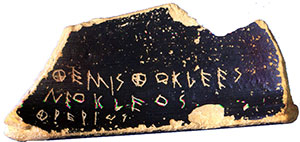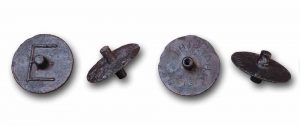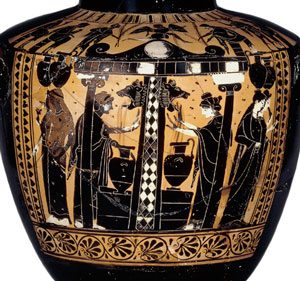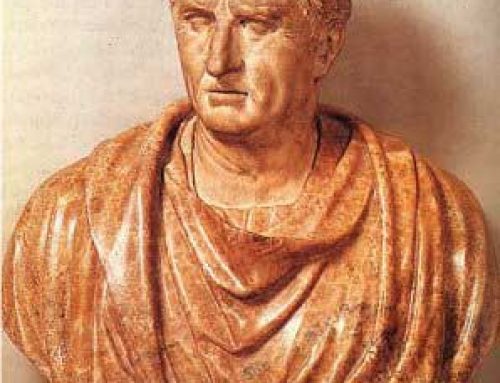
Government of ancient Greece: the Mask of Agamemnon, from Mycenae, Greece (1500 BC). Now in Athens
What kind of government did Ancient Greece have?
Ancient Greece had a lot of different kinds of governments, because there were many different city-states in ancient Greece.
What is a city-state?
More Ancient Greece articles
Each city-state had their own government. Some had kings, some had elected councils, some had councils that inherited power, and some had councils they chose by lottery.
People‘s ideas about what made a good government changed over time, too.
Aristotle and the government of Ancient Greece

Parthenon, Athens
The Greek philosopher Aristotle divided ancient Greek government into monarchies, oligarchies, tyrannies and democracies, and most historians still use these same categories. A monarchy is when a king or queen (or in Sparta two kings) rules the city-state.
An oligarchy is when a council of rich people inherits power from their parents. (Oligarchy means “the rule of the few.” A tyranny is when one of those oligarchs seizes power and rules illegally. And a democracy is when the people elect representatives, or choose them using a lottery system.
More about Aristotle

Spartan girl running (ca. 500 BC), maybe as part of religious games sponsored by her government
Most city-states in Greece started out by having monarchies, then oligarchies, then tyrannies and then democracies, but at each period ancient Greek government included plenty of city-states using a different system. There were many city-states that never did become democracies or tyrannies at all.
Bronze Age kings
In the Late Bronze Age (the Mycenaean period), between about 2000 and 1200 BC, all Greek city-states seem to have been monarchies, ruled by kings. Homer’s Iliad, and Greek mythology in general, shows us a whole series of kings like Agamemnon and Theseus, and some of their palaces have survived for archaeologists to dig up.
After the Dark Age, though, only a few Greek city-states still had kings. Sparta is the most famous of these, though actually Sparta had two kings, usually brothers or cousins, at the same time. One would stay home and the other go off to fight wars.
More about Late Bronze Age Greece
More about Sparta’s kings
Iron Age oligarchies and tyrants
In the Iron Age, the government of ancient Greece moved away from kings. People started to feel that having a king was a little old-fashioned. Instead, oligarchies ruled most Greek city-states in the Archaic period. Both Athens and Thebes had oligarchies at this time. An oligarchy is a group of aristocrats (rich men) who tell everyone else what to do.
Then in the 600s and 500s BC tyrants took over a lot of Greek city-states. A tyrant was usually one of the aristocrats who got power over the others by getting the support of the poor people. Tyrants ruled alone, kind of like kings, but without any legal right to rule. A tyrant was like a Mafia boss: he had power, and he had the support of the people. The tyrant’s power was informal, and often violent. On the other hand, to get the support of the people, tyrants often did help people. Sometimes they redistributed land, or forgave people’s debts, for example.
More about oligarchy
More about tyrants
How did people fall into debt?
Classical Greece: Democracy

Government of ancient Greece: Potsherd used to vote for Themistocles (can you see his name written on it?)
In 510 BC, the city-state of Athens created the first democratic government, and soon other Greek city-states imitated them. City-states that weren’t Greek, like Carthage and Rome, also experimented with giving the poor people more power in the late 500s BC.
Athens and democracy
But Athenian democracy did not really give power to everyone. Most of the people in Athens couldn’t vote – no women, no slaves, no foreigners (even Greeks from other city-states), no children.
Slavery in ancient Greece
Women in ancient Greece
Xenia and immigration

These were the tokens Athenian juries used to vote: there’s solid ones on the left and hollow ones on the right.
And also, Athens at this time had an empire, ruling over many other Greek city-states, and none of those people living in the other city-states could vote either. Of course it is a lot easier to have a democratic government when you are only deciding what other people should do. Athenians didn’t even have to charge themselves any taxes!
The Athenian empire
But not all Greek city-states became democracies. Many Greek city-states, like Sparta, kept oligarchic government, or tyrannies, or monarchies, through this whole time. Thebes only became a democracy in the 300s BC)
Sparta’s government
What did Greek government do?

Hoplite soldiers (Chigi Vase, ca. 640 BC)
Whatever kind of government you had, ancient Greek governments all had pretty much the same responsibilities. The most important thing was to organize an army that could defend the city-state against invasions. Greek governments also negotiated treaties and trade agreements with other Greek cities, and with the Scythians, the Persians, the Egyptians, Carthage, and the Etruscans in Italy. It built port facilities so that ships could dock there.
Ancient Greek economy
Greek wars and warfare
Inside the city, the government ran a police force to keep the peace. Most of the police were enslaved men, often from Scythia. They didn’t have prisons, but the government took charge of executing criminals, exiling them, or whipping them. The government collected taxes and tolls.

Women getting water at public fountain
It built temples and ran religious festivals like the Olympic Games so the city could stay on the good side of the gods. Greek city governments built public water fountains and drains to keep stormwater out of the streets. Ancient Greek government was not generally involved in health care or in schools.
Greek water systems
The Parthenon
The Olympic Games
Did we answer your questions about the government of Ancient Greece? Read more about democracy in Classical Athens. Or ask your questions in the comments!
Learn by doing: design your own perfect government
More about Ancient Greek government
Or about oligarchy
More about tyrants
More about Athenian democracy
Bibliography and further reading about ancient Greek government:
Oxford First Ancient History, by Roy Burrell and Peter Connolly (1997). Lively interviews and pictures make the ancient Mediterranean come to life. For teens.
Cleisthenes: Founder of Athenian Democracy, by Sarah Parton (2002). A biography of the founder of Athenian democracy.
Athenian Democracy, by A.H.M. Jones (reprinted 1986). One of the great social historians of the 20th century, though this isn’t easy going.
Alternatives to Athens: Varieties of Political Organization and Community in Ancient Greece, a collection of essays edited by Roger Brock and Stephen Hodkinson (2003). Each chapter presents a different kind of Greek government: oligarchies, tyrannies, monarchies, and so on. By specialists, for specialists.
Rome, the Greek World, and the East: Government, Society, and Culture in the Roman Empire, by Fergus Millar, Hannah M. Cotton, and Guy Rogers (2004). Millar is an expert on Roman government. This book deals with how the Romans governed in Greece.
Ottoman Centuries, by Lord Kinross (1979). A short introduction to Ottoman government, for the non-specialist. It’s a little out of date, so it doesn’t consider the role of Islam, or the role of women, as much as it might have.





WHERE ARE THE NAKED STATUES
You’ll find some here: https://quatr.us/greeks/ancient-greek-art-important.htm
Enjoy! But remember, these aren’t naked people; they’re not even photographs of naked people. They’re just photographs of big pieces of marble or bronze.
this is not good
with Classical Greece: Democracy and government of Ancient Greece
hey I need help with this website i do not understand it
I’d be happy to help. Can you ask a question? Then I’ll answer it.
._.
HI Karen,
I have a quiz on Greece : Geography and Trade , any websites you think mite help
Sure, Adrian! – Check out our article on the economy of ancient Greece: https://quatr.us/greeks/economy-ancient-greece.htm
and this one on the environment and geography: https://quatr.us/environment/ancient-greek-climate-plants-animals.htm
and on Greek cargo ships: https://quatr.us/greeks/cargo-ships-ancient-greece.htm
Here’s a more specific article on the economy of Archaic Greece: https://quatr.us/greeks/economy-archaic-greece.htm and there are links at the end to the articles on the economy of Classical and Hellenistic Greece too.
I hope that helps!
I need to know the three major periods in ancient greece
Probably Archaic, Classical, Hellenistic? You can read about those periods here: https://quatr.us/greeks/greek-history-ancient-greece.htm
hi karen!!!!!!! ok so i need a bit o help… i love history but need a bit of help…. can u help?
Sure, I’d be happy to help. What’s your question? (Your comments have to be moderated before they appear, so that’s why it takes a while.)
I have a question about a ancient greek city-state, Argos.
Could a person leave argos and move to a different city state? What were laws about this?
Also how were the laws made, and how where people elected to rule
You could move from one Greek city-state to another, yes, but it was like moving to a different country today. You had to get permission from the new city to live there, and you wouldn’t be a citizen – you would live there as a resident alien (a foreigner), so you couldn’t vote (if the city was a democracy). Even your children and your children’s children wouldn’t be citizens – they would still be resident aliens. They could marry other resident aliens, but they couldn’t marry citizens.
Greek systems of government varied a lot from city to city. But in Athens, they elected their generals, who generally acted like our Presidents do in the US. Everybody lined up at polling stations and dropped a piece of broken pottery with their candidate’s name on it into a basket or a pot. You can see an example ballot on this page.
But it was the Council of 500 (the Boule) that actually made laws, like our Congress. The members of the Boule were chosen by lottery, not elected. Athenians felt that the lottery was a way for the gods to choose who was in power, and that was better (and harder to bribe people) than elections.
Hi! I am currently studying the politics of Ancient Greece. Do you have an artical that explains more about oligarchy?
Yes! You’ll find it here: https://quatr.us/government/oligarchy-rule-few.htm . Also please click on the other links in the article for more information.
Thank you this helped alot!!e
What was the structure of a monarchy?
It depends on the monarchy, but you can read about Chinese emperors here: https://quatr.us/china/government-ancient-china-emperors.htm and about Egyptian pharaohs here: https://quatr.us/egypt/pharaoh-government-ancient-egypt.htm
and about medieval feudalism here: https://quatr.us/government/what-is-feudalism-definitions.htm
I hope that helps!
Ancient sparta actually founded democracy over a century before the Athenians
Only they still had kings? What makes you think that Sparta was a democracy?
on greeks governments
i was looking for democracy,tyrants,oligarchy, and monarchy
You’ll find more about democracy here: https://quatr.us/government/who-invented-democracy.htm
and about tyrants here: https://quatr.us/government/what-is-tyranny-definition.htm
and about oligarchy here: https://quatr.us/government/oligarchy-rule-few.htm
and about monarchy here: https://quatr.us/government/what-is-a-monarchy-definition.htm
O
i don’t see anything i was looking for
What were you looking for, Alex?
Is their any more information on monarchy? I am trying to create a picture that represents every point of monarchy but i am really struggling, any pointers?
You can read more about monarchy here: https://quatr.us/government/what-is-a-monarchy-definition.htm . Does that help?
what would happen if all the greek citys went into war to eachother
Check out this article about exactly that: https://quatr.us/greeks/peloponnesian-war-athens-sparta.htm
*cities
GO READ THE BIBLEEEEEEEEEEEEEEEEEEEEEEEEEEe
An excellent idea! The Bible is an important document. But it has little to say about the government of ancient Greece, so maybe also read Herodotus and Thucydides :)
Hi I can’t still find out how most Greek city-states evolved from
From oligarchy to democracy? Well, most of them didn’t, but you can read more about the ones that did by clicking the links for Athens and Corinth.
Hello I still can´t find out who was the ruler who instituted democracy in Athens
You want to read this article: https://quatr.us/greeks/democracy-classical-athens.htm
karen carr are you a real person
do you have a life
I like studying history, and I hope you will soon too!
Help me please I have autism
Hi! Just ask your question here and I’ll try to answer it.
can you help me
Sure! Ask a question and I’ll try to answer it.
this needs to be simplified
Sorry you didn’t like this article! I’d be happy to answer any questions if you want to ask them.
thanks
thanks this helped a lot
i need help with this. What is the name of the first greeks in peloponnesus
Are you thinking of the mythical king Pelops, who gave his name to the Peloponnesus? You can read about him here: https://quatr.us/greeks/pelops-chariot-race-greek-mythology.htm
Thanks for the help Carr!
i need help with summit 6
Sorry, but that’s not a question? I don’t know what summit 6 is.
i need help with a question
What’s the question?
this did not help at all
Sorry to hear it! If you ask your question here, I’ll try to answer it.
Hi. Im my name is Victor and this was super helpful for my test. /(^_^)/
the time set is way to early i literly posted at 1:00pm
It’s probably a time zone issue, but I guess it doesn’t matter very much when the timestamp is.
this was so cool more knollege
how did the Athens created the greek government
You can find out more about it here: https://quatr.us/greeks/greek-hoplites-democracy.htm and here: https://quatr.us/greeks/democracy-classical-athens.htm
a lot of add´s so enjoying
Sorry! The advertising pays for the site, but we’re working on a paid version.
Why is Ancient Greece so interesting?
Mostly, I think, because it’s the earliest civilization that has left us a lot of writing where we can really see people as individuals and what they were thinking (or at least what Greek people wanted us to think they were thinking). So we feel like we know the Greeks, like they were our friends.
Hi, i have a question
What is your question, Friko?
thanks alot
karen carr
You’re welcome!
this website is great for people but might be complicated for people who are new to this and i got distracted from the add but besides ll that is good keep on going
Thanks! If you have any suggestions to make navigation easier, please let us know! We’re working on a paid version that wouldn’t have any ads.
thank you this helped so much
thank you this helped me a lot.
Yay!
Thank you. This article helped alot.
Delighted to hear it!
So exactly what places used tyranny?
(What city-states)
There was a tyranny in Athens, most famously: you can read about it in this article – https://quatr.us/greeks/athens-tyrants-ancient-greece.htm . There were also tyrants in Corinth: https://quatr.us/greeks/corinth-classical-period.htm , and in various cities in Sicily. Many other Greek city-states also had a tyrant at one time or another. And the word seems to be Lydian in origin, probably because they had tyrants there, too.
who was the ruler who instituted democracy in Athens?
He’s not exactly a ruler, but you’re probably thinking of Cleisthenes? See my answer to an earlier comment.
i would need help
Hi Jose! I’d be happy to help. What is your question? What do you need to know?
where was the ruler who instituted democracy in athens?
Well, he’s not a ruler exactly, but you might be thinking of Cleisthenes? You can read more about Cleisthenes here: https://quatr.us/history/democracy-classical-athens.htm
i am cool kid
i need help
i was kidding it didnt help
this didnt help alot but it helped a little bit
Well, I’m glad we could help a little bit!
hi
hi yourself! thanks for stopping by!
Hi
I wanted to know if you could answer the questions of how the greeks were able to move towards democracy and the importance of reforms that helped Athens become more democratic
I think you’ll find what you’re looking for in this article about tyranny in Athens: https://quatr.us/greeks/athens-tyrants-ancient-greece.htm and this one about democracy in Athens: https://quatr.us/greeks/democracy-classical-athens.htm . But let me know if you have more questions after you read these.
thanks this helped
Wonderful! I’m happy to hear it.
not really helpful
What were you looking for? I’d be happy to answer your questions.
THIS DIDN’T HELP AT ALL!!!! Thanks for nothing!
Sorry to hear it! What were you trying to find out? Maybe I can answer your question.
UMMMMMM a lot of ads. I got distracted multiple times.
Sorry! We do have to pay the costs of the site somehow. We’re working on an ad-free paid version though.